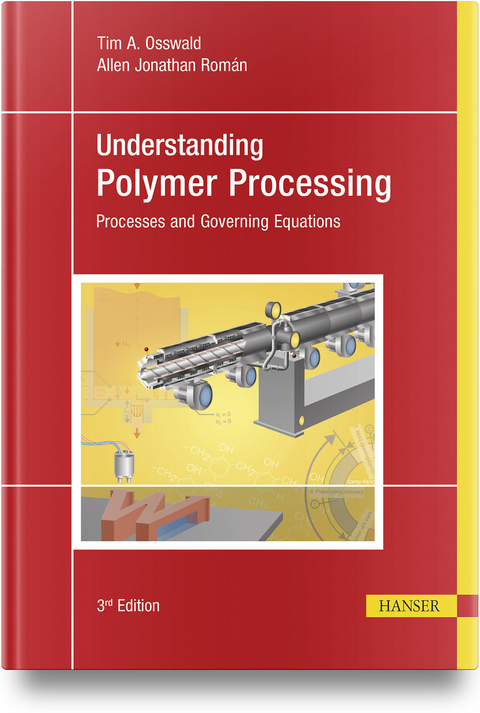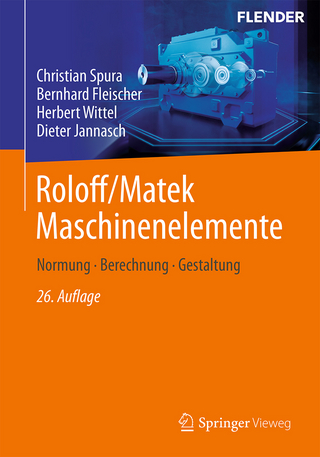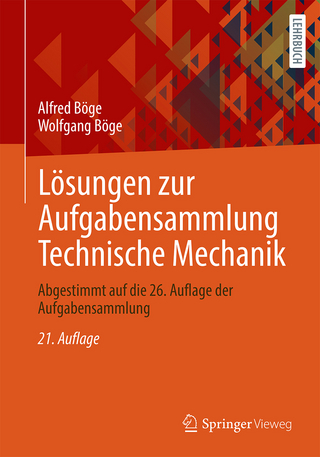
Understanding Polymer Processing
Processes and Governing Equations
Seiten
2024
|
3rd Revised edition
Hanser Publications (Verlag)
978-1-56990-922-5 (ISBN)
Hanser Publications (Verlag)
978-1-56990-922-5 (ISBN)
Combines practical engineering concepts with modeling of realistic polymer processes to provide the background needed to understand the wide field of polymer processing as well as the emerging technologies associated with the plastics industry today. Provides a solid knowledge base in polymer materials, polymer processing, and modeling.
This book provides the background needed to understand not only the wide field of polymer processing, but also the emerging technologies associated with the plastics industry in the 21st century. It combines practical engineering concepts with modeling of realistic polymer processes. Divided into three sections, it provides the reader with a solid knowledge base in polymer materials, polymer processing, and modeling.
Understanding Polymer Processing is intended for the person who is entering the plastics manufacturing industry and as a textbook for students taking an introductory course in polymer processing. It also serves as a guide to the practicing engineer when choosing a process, determining important parameters and factors during the early stages of process design, and when optimizing such a process. Practical examples illustrating basic concepts are presented throughout the book.
New in the third edition are chapters on data-driven modeling and physics-driven modeling, as well as new sections on manufacturing and dimentional analysis. In addition to a number of other smaller improvements and corrections throughout the book, bonus code downloads are also provided.
Part I: Polymeric Materials: This section gives a general introduction to polymers, including mechanical behavior of polymers and melt rheology. Part II: Polymer Processing: The major polymer processes are introduced in this section, including extrusion, mixing, injection molding, thermoforming, blow molding, film blowing, and many others. Part III: Modeling: This last section delivers the tools to allow the engineer to solve back-of-the-envelope polymer processing models. It includes dimensional analysis and scaling, transport phenomena in polymer processing, and modeling polymer processes.
This book provides the background needed to understand not only the wide field of polymer processing, but also the emerging technologies associated with the plastics industry in the 21st century. It combines practical engineering concepts with modeling of realistic polymer processes. Divided into three sections, it provides the reader with a solid knowledge base in polymer materials, polymer processing, and modeling.
Understanding Polymer Processing is intended for the person who is entering the plastics manufacturing industry and as a textbook for students taking an introductory course in polymer processing. It also serves as a guide to the practicing engineer when choosing a process, determining important parameters and factors during the early stages of process design, and when optimizing such a process. Practical examples illustrating basic concepts are presented throughout the book.
New in the third edition are chapters on data-driven modeling and physics-driven modeling, as well as new sections on manufacturing and dimentional analysis. In addition to a number of other smaller improvements and corrections throughout the book, bonus code downloads are also provided.
Part I: Polymeric Materials: This section gives a general introduction to polymers, including mechanical behavior of polymers and melt rheology. Part II: Polymer Processing: The major polymer processes are introduced in this section, including extrusion, mixing, injection molding, thermoforming, blow molding, film blowing, and many others. Part III: Modeling: This last section delivers the tools to allow the engineer to solve back-of-the-envelope polymer processing models. It includes dimensional analysis and scaling, transport phenomena in polymer processing, and modeling polymer processes.
Tim A. Osswald, Ph.D., is Kuo K. and Cindy F. Wang Professor at the University of Wisconsin-Madison College of Engineering and Honorary Professor of Plastics Technology at the University of Erlangen-Nuremberg and the National University of Colombia. He is the author of many books and book chapters, as well as over 100 papers in the field of plastics technology. Allen J. Román, Ph.D., is Chief Engineer and Graduate Research Fellow at the Polymer Engineering Center, University of Wisconsin-Madison.
| Erscheinungsdatum | 18.11.2024 |
|---|---|
| Sprache | englisch |
| Maße | 152 x 229 mm |
| Themenwelt | Technik ► Maschinenbau |
| Schlagworte | Additive Manufacturing • Extrusion • injection molding • Kunststoffe • Kunststofftechnik • Kunststoffverarbeitung • Plastics • Plastics Engineering • Plastics Processing • plastics technology • Process Modeling • rheology • Textbook • Transport phenomena |
| ISBN-10 | 1-56990-922-9 / 1569909229 |
| ISBN-13 | 978-1-56990-922-5 / 9781569909225 |
| Zustand | Neuware |
| Informationen gemäß Produktsicherheitsverordnung (GPSR) | |
| Haben Sie eine Frage zum Produkt? |
Mehr entdecken
aus dem Bereich
aus dem Bereich
Normung, Berechnung, Gestaltung
Buch | Softcover (2023)
Springer Vieweg (Verlag)
39,99 €
Buch | Softcover (2023)
Springer Vieweg (Verlag)
24,99 €
Buch | Softcover (2024)
Springer Vieweg (Verlag)
32,99 €


